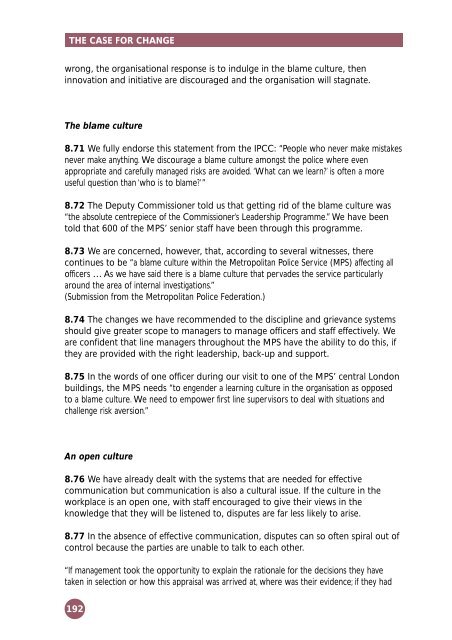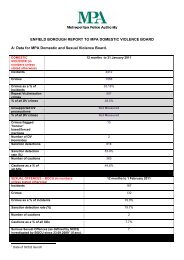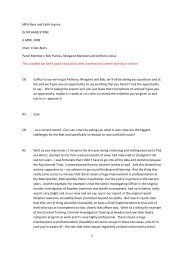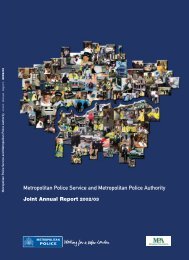Final Report of the Morris Inquiry: The Case for Change
Final Report of the Morris Inquiry: The Case for Change
Final Report of the Morris Inquiry: The Case for Change
You also want an ePaper? Increase the reach of your titles
YUMPU automatically turns print PDFs into web optimized ePapers that Google loves.
THE CASE FOR CHANGE<br />
wrong, <strong>the</strong> organisational response is to indulge in <strong>the</strong> blame culture, <strong>the</strong>n<br />
innovation and initiative are discouraged and <strong>the</strong> organisation will stagnate.<br />
<strong>The</strong> blame culture<br />
8.71 We fully endorse this statement from <strong>the</strong> IPCC: “People who never make mistakes<br />
never make anything. We discourage a blame culture amongst <strong>the</strong> police where even<br />
appropriate and carefully managed risks are avoided. ‘What can we learn?’ is <strong>of</strong>ten a more<br />
useful question than ‘who is to blame?’”<br />
8.72 <strong>The</strong> Deputy Commissioner told us that getting rid <strong>of</strong> <strong>the</strong> blame culture was<br />
“<strong>the</strong> absolute centrepiece <strong>of</strong> <strong>the</strong> Commissioner’s Leadership Programme.” We have been<br />
told that 600 <strong>of</strong> <strong>the</strong> MPS’ senior staff have been through this programme.<br />
8.73 We are concerned, however, that, according to several witnesses, <strong>the</strong>re<br />
continues to be “a blame culture within <strong>the</strong> Metropolitan Police Service (MPS) affecting all<br />
<strong>of</strong>ficers … As we have said <strong>the</strong>re is a blame culture that pervades <strong>the</strong> service particularly<br />
around <strong>the</strong> area <strong>of</strong> internal investigations.”<br />
(Submission from <strong>the</strong> Metropolitan Police Federation.)<br />
8.74 <strong>The</strong> changes we have recommended to <strong>the</strong> discipline and grievance systems<br />
should give greater scope to managers to manage <strong>of</strong>ficers and staff effectively. We<br />
are confident that line managers throughout <strong>the</strong> MPS have <strong>the</strong> ability to do this, if<br />
<strong>the</strong>y are provided with <strong>the</strong> right leadership, back-up and support.<br />
8.75 In <strong>the</strong> words <strong>of</strong> one <strong>of</strong>ficer during our visit to one <strong>of</strong> <strong>the</strong> MPS’ central London<br />
buildings, <strong>the</strong> MPS needs “to engender a learning culture in <strong>the</strong> organisation as opposed<br />
to a blame culture. We need to empower first line supervisors to deal with situations and<br />
challenge risk aversion.”<br />
An open culture<br />
8.76 We have already dealt with <strong>the</strong> systems that are needed <strong>for</strong> effective<br />
communication but communication is also a cultural issue. If <strong>the</strong> culture in <strong>the</strong><br />
workplace is an open one, with staff encouraged to give <strong>the</strong>ir views in <strong>the</strong><br />
knowledge that <strong>the</strong>y will be listened to, disputes are far less likely to arise.<br />
8.77 In <strong>the</strong> absence <strong>of</strong> effective communication, disputes can so <strong>of</strong>ten spiral out <strong>of</strong><br />
control because <strong>the</strong> parties are unable to talk to each o<strong>the</strong>r.<br />
“If management took <strong>the</strong> opportunity to explain <strong>the</strong> rationale <strong>for</strong> <strong>the</strong> decisions <strong>the</strong>y have<br />
taken in selection or how this appraisal was arrived at, where was <strong>the</strong>ir evidence; if <strong>the</strong>y had<br />
192





![Appendix 1 [PDF]](https://img.yumpu.com/51078997/1/184x260/appendix-1-pdf.jpg?quality=85)

![Transcript of this meeting [PDF]](https://img.yumpu.com/50087310/1/184x260/transcript-of-this-meeting-pdf.jpg?quality=85)
![Street drinking in Hounslow [PDF]](https://img.yumpu.com/49411456/1/184x260/street-drinking-in-hounslow-pdf.jpg?quality=85)








